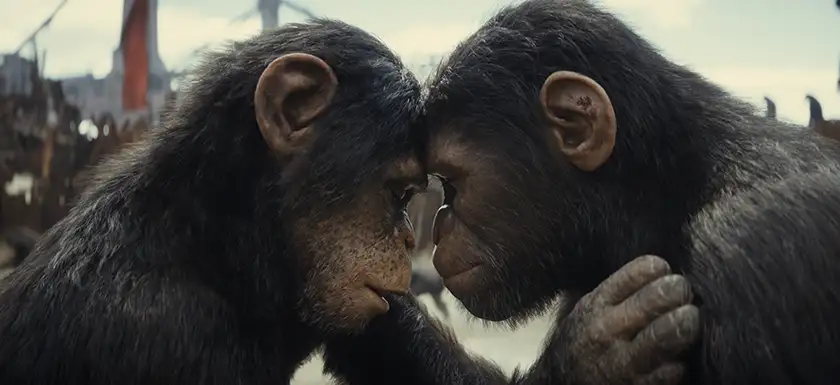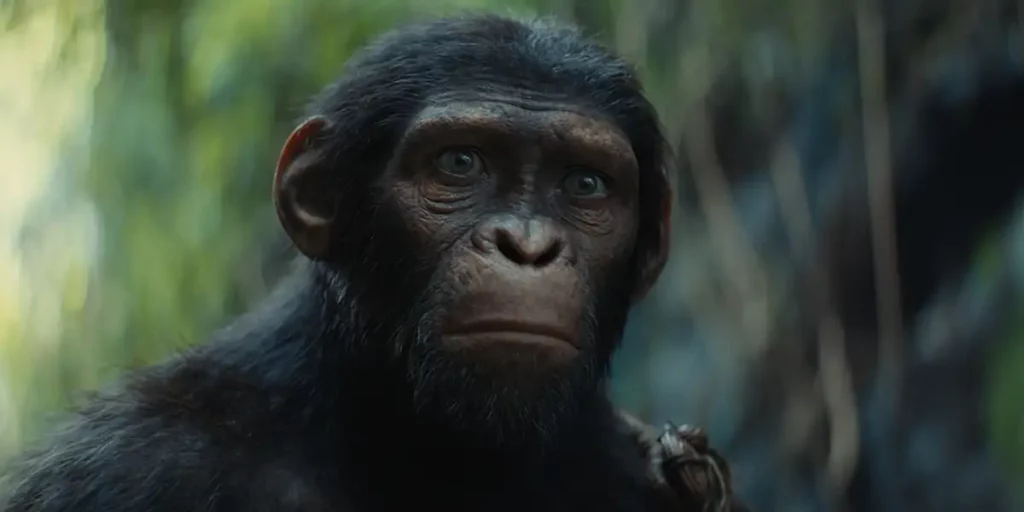With the epic trilogy opener Kingdom of the Planet of the Apes, Wes Ball further cements this franchise’s stellar modern reputation.
Director: Wes Ball
Genre: Action, Adventure, Sci-Fi
Run Time: 142′
US Release: May 10, 2024
UK Release: May 9, 2024
Watch Kingdom of the Planet of the Apes: in theaters
Despite the obvious suffering (and often the zombies), the end of humanity in films has always been strangely beautiful; melancholic but peaceful, oddly tranquil, a reset for the planet. Kingdom of the Planet of the Apes—Wes Ball’s (The Maze Runner) first in a planned trilogy—recognises this beauty completely, with sweeping vistas of crumbling cities dwarfed by the environment and amplified sound design of all nature’s wonderful noise.
Like in the original 1968 Planet of the Apes, our human world is blanketed by the natural world now. Kingdom of the Planet of the Apes might be more bloated than the modern trilogy opener Rise of the Planet of the Apes (2011), and Kingdom will inevitably be judged against what comes next, but everything points to a thrilling continuation of this futuristic franchise.
Set many generations after the events of War for the Planet of the Apes (2017), Ball’s follow-up sees apes, all now talking, as the dominant species. Humans are a rarity; it is even suggested herds of humans are now a thing of the past altogether. Kingdom of the Planet of the Apes follows Noa (Owen Teague, I See You), a young chimpanzee living with his eagle clan. His peaceful existence is upended when a rogue clan attacks his village, killing his father and kidnapping, amongst others, his mother and best friends. This rogue clan is headed by Proximus Caesar (Kevin Durand, Abigail), a bonobo with plans to harvest human technology for his own advantage. Noa’s sweeping quest begins, and it is one of beauty, discovery, revenge, fear, and thumping action.
In these early stages, writer Josh Friedman (War of the Worlds) sets things up nicely. Kingdom of the Planet of the Apes has a lot to get through, and Friedman’s patience is admirable. However, the film ultimately rushes its conclusion, and Durand’s Proximus Caesar is severely underused and woefully underwritten; there is potential there for another complex villain like Koba, but it is missed. Nevertheless, as the opening film in a trilogy, Kingdom of the Planet of the Apes sets the future of the franchise up terrifically. Andy Serkis’ Caesar might be gone, but his influence and teachings remain—but only just. Noa feels like a worthy successor to Caesar, with Teague shining with a similar grit and depth to Serkis’ lauded performances.

Kingdom of the Planet of the Apes has some thrilling set pieces and Ball brings clarity and tension to the action, but the film is also emotionally compelling. Just as in the previous Apes trilogy, the characters are so important here. Some, like Proximus Caesar, falter, but for the most part—especially in the form of Noa, Raka (Peter Macon, The Orville), and Mae/Nova (Freya Allan, The Witcher)—we are treated to wonderfully complex and hugely watchable characters. In particular, Mae/Nova is a terrific addition, and not just a rewrite of the more equality-focussed Malcolm (Jason Clarke, Oppenheimer) from Dawn of the Planet of the Apes (2014).
Kingdom of the Planet of the Apes is also impressive on its thematic levels. The roles of humans and apes have been effectively reversed, with people now lacking speech whilst the primates talk and build civilisations. This isn’t a bad thing; Friedman doesn’t give humans any precedence over apes or, more widely, nature. The world seems to flourish now without humanity’s dominance. The age-old question on whether ape and human can actually co-exist is also raised again. Understandably, as has been proven throughout this franchise, it is a difficult one to answer.
Kingdom of the Planet of the Apes will inevitably be compared to the franchise’s previous trilogy—specifically the two critically acclaimed films from Matt Reeves—and whilst it lacks the tight structures and really memorable action of those films, Kingdom still manages to be an enjoyable blockbuster. Mild pacing issues and the fumbled climax aside, Ball’s film will please anyone eager to dip back into this fascinating ape-dominated universe. Rise, Dawn, War, Kingdom; what comes next is anyone’s guess, but it promises to be an action-filled and epic spectacle like few other blockbusters out there.
Kingdom of the Planet of the Apes will be released globally in theaters on May 10, 2024. Read our review of Dawn of the Planet of the Apes!

